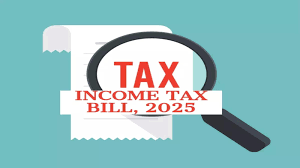Expanded GAAR Powers in Income Tax Bill 2025
Current Affairs NationalPosted by newadmin on 2025-03-03 08:49:45 |
Share: Facebook | Twitter | Whatsapp | Linkedin Visits: 75

The Income Tax Bill 2025 introduces significant changes to the General Anti-Avoidance Rules (GAAR), aiming to grant tax authorities extended powers in issuing reassessment notices beyond the current time limits. This amendment is intended to strengthen measures against tax avoidance by allowing reassessments of tax years that were previously considered time-barred.
GAAR is a regulatory framework designed to prevent tax avoidance through transactions classified as impermissible avoidance arrangements (IAAs). It empowers tax authorities to reclassify certain financial arrangements, enabling them to recompute income and tax liabilities. However, the invocation of GAAR is subject to oversight by an Approving Panel, which is chaired by a High Court judge to ensure fair application.
Under the existing tax framework, reassessment notices must be issued within a time frame of five years and three months for cases where under-reported income exceeds ₹50 lakh. The new proposal removes this constraint, allowing reassessment notices to be issued for tax years beyond this limit. The objective of this amendment is to address cases where tax avoidance arrangements span multiple years, ensuring that authorities can scrutinize and reassess transactions even if they fall outside the usual timeframe.
To prevent the potential misuse of GAAR provisions, the amendment includes specific safeguards. The decisions made by the GAAR Panel will serve as a valid indication that income has escaped assessment. Additionally, the requirement for a hearing before issuing reassessment notices is waived in GAAR cases, streamlining the process and making it more efficient for tax authorities.
The proposed changes provide greater flexibility to tax authorities, allowing them to reassess not only the current assessment year but also preceding years. This is particularly important when evaluating IAAs, as the process can be time-consuming. The new provisions ensure that procedural delays do not prevent tax authorities from addressing tax avoidance.
For instance, if a case is referred to the GAAR Panel on May 31, 2023, for the assessment year 2018-19, and the panel approves the invocation of GAAR for both 2018-19 and 2017-18, tax authorities will now have the ability to issue reassessment notices for 2017-18, even though the outer time limit has already expired. This change reinforces the government's commitment to tackling tax avoidance and ensuring tax compliance across multiple financial years.
Search
Categories
Recent News
- Justice Delayed: 100-Year-Old's Long Wait for Freedom
- Instagram Outage: Users Locked Out, Posts Vanish
- Royal Family's Son Denies Rape Allegations: A Troubled Life in the Spotlight
- DEA Cracks Down on Fake Pharmacies: Over 200 Websites Shut Down
- Giant Phantom: Unveiling the Ocean's Elusive Giant
- Manchester's Jewish Leaders Rebuke Guardiola's Political Remarks
- Uncovering Khalistani Sleeper Cells: Delhi's Republic Day Plot Foiled
- Chairman of Al-Falah University Jailed in Fraud Investigation
Popular News
- Navigating IPO Market Dynamics Amid Volatility and Regulatory Changes
- Massive Worldwide Microsoft Outage Disrupts Multiple Sectors
- Panjapur Bus Stand to Reshape TNSTC Routes
- తెలుగుదేశం పార్టీ - పేదరికాన్ని నిర్మూలించడంలో వాగ్దానం
- Universities Embrace Remote Learning Technologies Amidst Ongoing Pandemic